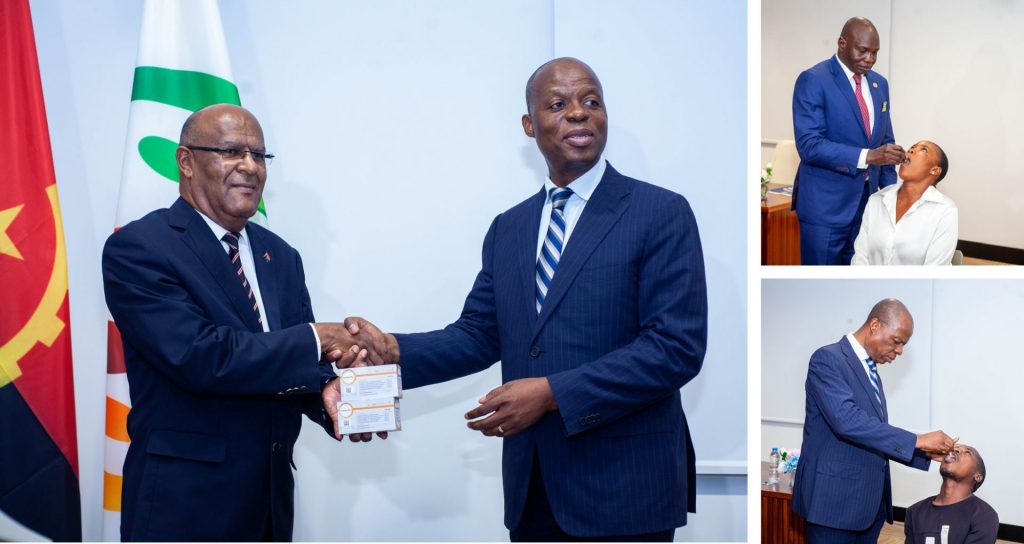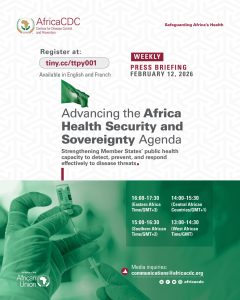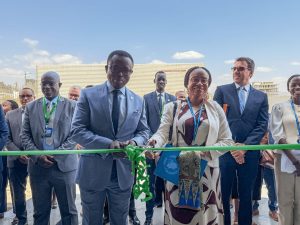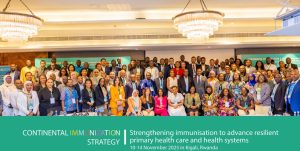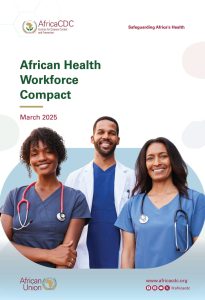Angola received 2,000 life-saving oral cholera vaccines for frontline healthcare workers from the Africa Centres for Disease Control and Prevention (Africa CDC) in March 2025.
Dr. Ngashi Ngongo, Principal Advisor to the Director General of Africa CDC on Programs, represented H.E. Dr. Jean Kaseya at the handover ceremony of oral cholera vaccines in Luanda, Angola.
The vaccines are part of Africa CDC’s efforts to support Angola’s response to multiple health emergencies, including cholera and Mpox. Since the cholera outbreak, Africa CDC has deployed 10 healthcare experts to support surveillance, preparedness and response, laboratory capacity, IPC, case management, and environmental surveillance. It has also procured WASH supplies and provided capacity-building training for healthcare workers.
Dr. Silvia Lutucuta, Angola’s Minister of Health, praised Africa CDC’s efforts in dedicating vaccines to frontline healthcare workers, who put their lives on the line daily to care for those affected by infectious diseases like cholera, Mpox, and Marburg. This move recognizes the vital role healthcare workers play in combating these health crises.
Africa CDC has developed a three-month Incident Action Plan to help tackle the cholera outbreak in Angola. On February 8, the government of Angola received support from a multidisciplinary team of experts from Africa CDC’s Southern Africa Regional Coordinating Centre (SARCC).
After the first case was confirmed in the municipality of Cacuaco, Luanda Province, on January 7, 2025, the Angolan Ministry of Health declared a new cholera outbreak.
As of March 8, 2025, there have been 11,307 cases and 421 deaths since the outbreak began. This gives a case fatality rate of 3.6%. Of the deaths, 289 (69%) occurred in health facilities, and 132 (31%) in communities. These cases have been reported in 17 out of 21 provinces: Namibe, Luanda Sul, Bie, Benguela, Cubango, Uige, Cabinda, Cuanza Sul, Cunene, Luanda, Huambo, Huila, Icolo e Bengo, Bengo, Malanje, Zaire, and Cuanza Norte.
A total of 17 provinces have reported cholera cases to date, while Luanda, Bengo, Cuanza Norte, and Icolo e Bengo are the epicentres of the cholera outbreak, constituting approximately 98% of all cases.
A situational report from Africa CDC on February 28 shows that Bengo Province has the highest attack rate at 31.6 per 10,000 people. This highlights how rural provinces with poor water and sanitation can see average attack rates over 5%.
Among the country’s response and control measures, Angola’s President, H.E. João Lourenço, plays a significant role in the cholera outbreak response, including making regular supportive visits to affected communities.
The Angolan government has a funded national response plan for cholera worth USD 6.5 million, which covers multiple sectors. The country has activated technical working groups at national and provincial levels to coordinate the response. Key pillars include coordination and leadership, surveillance, laboratory, case management, water, sanitation and hygiene (WASH), infection prevention and control (IPC), vaccination, risk communication, and community engagement.
A national Cholera Interministerial Commission has been established, chaired by Minister of Health Dr. Lutucuta. The Commission holds weekly coordination meetings and conducts joint support visits to affected communities.
As part of the response, communities are now being provided with potable safe water. The government, through the Luanda Provincial Governor, has temporarily closed the Mabunda fish market due to poor water and sanitation services. Authorities are coordinating the provision of clean water and sanitation services to the market and have issued an official closure notice.
There are plans to enhance the community referral system. The government has established cholera treatment centres in all affected communities and created community oral rehydration points for case management.
The Ministry of Health received 948,500 doses of the Euvichol® vaccine on January 28, 2025, from the International Coordination Group on Vaccine Provision. The oral cholera vaccination campaign took place in Luanda, Icolo e Bengo, and Bengo provinces from February 3 to February 8, 2025. A total of 925,026 people were vaccinated, achieving 86% vaccination coverage.
The cholera outbreak in Angola is ongoing. Each day, there is an average of 120 new cases and five deaths. The report suggests that Africa CDC should continue to provide on-the-ground support for the cholera response, including regular visits to treatment centres for technical support and assistance in investigating the outbreak and identifying risk factors in affected communities.
The report emphasizes the need for enhanced on-the-job training for health workers at cholera treatment centres. This training should focus on surveillance, case management, and IPC. It also recommends strengthening risk communication and engaging communities through multiple platforms to encourage early health-seeking behaviour and improve referrals.
“Africa CDC greatly appreciates the strides the Government of Angola has made toward the ongoing cholera response,” said Batsirai Mbodza, Africa CDC’s Southern Africa Region Mpox Incident Manager, currently based in Angola.
The Africa CDC team on the ground is supporting government efforts in collaboration with the multidisciplinary team and partners in Angola. The response spans national, provincial, and municipal levels. “Given the response initiatives, Africa CDC recommends greater focus on and strengthened access to care, promptness of care, and quality of care to reduce the current high case fatality rate,” said Mbodza.

